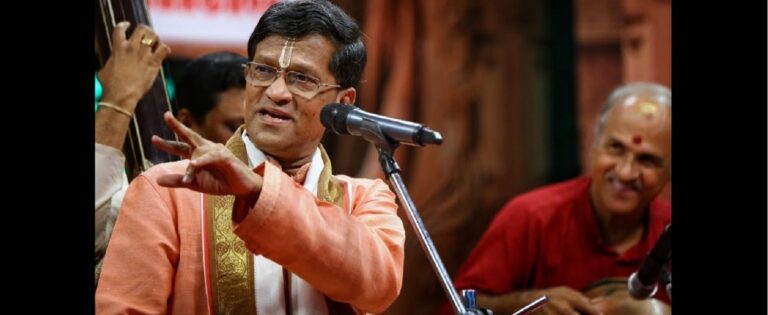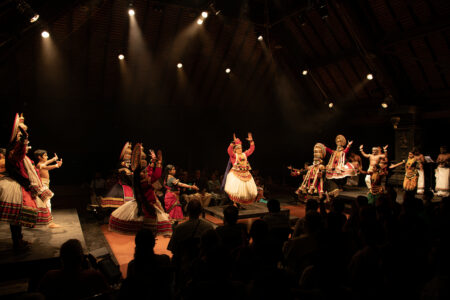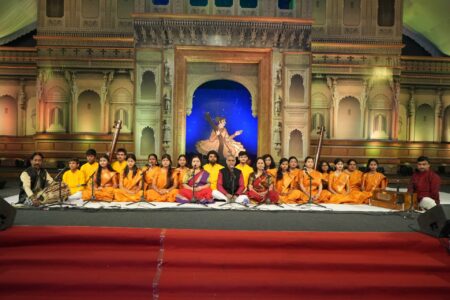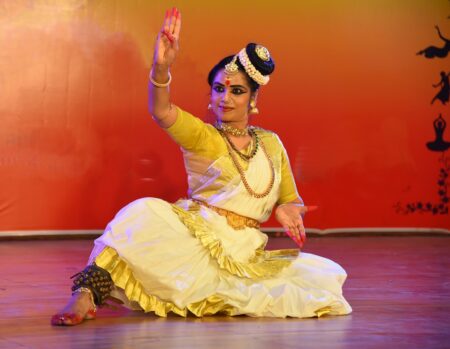Scholarly Carnatic vocalist Neyveli R Santhanagopalan, on how music and cuisine share a delicious bond
Music takes taste. So does food. Maybe that’s why music and food share a great bond, especially in the world of Carnatic.
Surprised? Well, let me give you some food for thought on this matter as another Margazhi season approaches. Margazhi Maha Utsavam is not only a festival of music; it is also a time where Chennai’s sabha canteens prepare mouth-watering food. To fill the many-sized tummies of the artistes as well as the buffs. Or, vidwans and rasikas, to express the two words in Tamil.
Sangeetham and saapadu are similar in many ways, in case you haven’t noticed yet. There is sangeetham in saapadu. True, saapadu generally means meals. Now, split saapadu, you get saa padu. Translated into English, it means ‘sing sa’ (‘sa’ being the first of the seven notes of south Indian classical). Just as saapadu is amrutham for a hungry soul, sangeetham is nectar for those who long for aesthetic satisfaction.
An artiste must be like an excellent chef. A chef cooks according to the taste of the diners while the artiste sings according to the aesthetic needs of the rasikas. In our music, each raga is alluring. That said, whether it soothes the audience entirely lies on the artiste’s skills and how (s)he handles the raga. The artiste has to add right amount of gamaka, bhava and manodharma in proper place.
Optimal input
In the same way, every ingredient added in the food has its own unique flavour. But not everyone can do this! Only an expert chef can add the right amount of spices and make a delicious dish. Like the salt in the food, sruti is the most important aspect of music. All the ingredients have to be added accurately in a dish, like laya or taala, which is the measurement in our sangeetham.
Now comes the art of serving. The food cooked may be very tasty. But if it is not served properly on time, it will get cold or even get spoiled. Likewise, if you don’t know the tempo of the raga or how to develop it in a crisp manner, you will spoil the taste of the raga. However, you cannot eat while singing but during singing you can cook.
As a child when your mother serves you food, you start developing tastes. And slowly you will develop your own taste. This goes for music as well. A mother knows which food will be good for the child, at what time. For nourishments, she chooses some food and when the child is not well, she will feed it with a different combo of food. In music, the artiste should know what to present, when, according to the audience needs and acceptation levels. Then sabha gaanam will become sabhaash gaanam.
Both food and music should be served only when there is an appetite for it. Also, it should stop serving at the saturation point. Otherwise, connoisseurs will be bored. Basically, both food and music evoke rasas or taste. According to ayurveda, a healthy diet, invokes shadrasa, in the same way, an excellent kucheri evokes navarasas, or the nine emotions. So, get your taste buds ready this season. There is good music and good food on the way!
Thiruvalluvar’s tip
In our cuisine, we have cereals like rice, wheat which are heavy and come as a main dish. Similarly, in Carnatic music, we have major ragas such as Thodi, Shankarabharana and Kalyani. Like side dishes, we have so many light ragas. To enjoy music as well as food, we also should have a lot of acquired tastes. Classical music is like home food. But there are forms of music which are purely entertainment which is like dining out. Bani (singing style)in our music is like what for cooking is Kaipakvam (the knack of the hands to get the right taste).
Music and food evoke senses. When food is cooked in the kitchen, you are tempted to taste it sensing through your nose. Likewise, you get attracted to a good music through your ears. Thus listening becomes the first and most important step in our music. Young musicians should listen a lot.
Saint-poet Thiruvallur said our tummy needs food only if we do not have food for your ears, that is good music. But we should not ignore the fact that you can neither sing nor listen to music for long when the stomach is empty.




